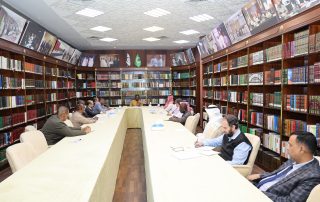
In the Name of Allāh,
the Entirely Merciful, the Especially Merciful
Praise is due to Allāh, Lord of the worlds, may the blessings and peace be upon our master Muḥammad, the last of prophets, on his family, and all his companions.
Resolution No. 76 (7/8) Problems of Islamic Banks
The Council of the International Islamic Fiqh Academy of the Organization of the Islamic Conference, holding its 8th session in Bandar Seri Begawan, Brunei Darussalam, on 1–7 Muḥarram 1414h (21–27 June 1993),
Having examined the research papers submitted to the Academy concern- ing the Problems of Islamic Banks, which contained suggestions for dealing with these problems in their Shariah, technical or administrative aspects, as well as the problems of their relations with other different parties,
Having listened to the discussions on these problems.
Resolves
To submit the following list with its four themes to the Secretariat General of the Academy in order to commission experts to present their findings at future sessions, in the order of priority deemed appropriate by the planning division.
Theme I: Deposits and related Issues
- Guaranteeing investment deposits in ways consistent with Shariah- approved Muḍārabah rules.
- Deposit exchange between banks on non-usury basis.
- Shariah characterization of deposits and their accounting
- Extending credit to a person on condition to use it in dealing with the Bank in general or in a specific activity.
- Muḍārabah costs and the party to bear them (Muḍārib or objectof Muḍārabah),
- Defining the relation between depositors and
- Brokerage in Muḍārabah, Ijārah (leasing) and
- Defining the Muḍārib in Islamic banking (shareholders, governing board, or executive management).
- Islamic alternative for overdraft
- Zakāh on Islamic banks’ funds and
Theme II: Murābaḥah
- Murābaḥah in
- Postponing ownership registration in Murābaḥah sales to ensure that the bank’s right to settlement remains
- Deferred payment Murābaḥah with delegation of the purchase orderer and considering him as a trustee.
- Procrastination in the settlement of debts resulting from Murābaḥah or deferred
- Debt
- Debt
Theme III: Leasing
- Re-leasing to the owner of the leased asset or to someone
- Letting people’s services and sub-letting
- Leasing, loaning, or mortgaging shares.
- Maintenance of leased
- Purchasing a commodity from a person on the condition that he leases it back.
- Combining Ijārah and Muḍārabah.
Theme IV: Contracts
- Consensual condition to the bank’s right to cancellation in case of default in payment of installments.
- Consensual condition for change in the contract’s type in case of default in payment of installments.
Recommendations
First: Islamic Banks should continue their dialogue with the central banks in Muslim countries to enable the Islamic banks to fulfill their mission of investing their clients’ funds, in accordance Shariah principles that governing banking ac- tivities and are compatible with their specific nature. Moreover, Central banks should respect the conditions required for the Islamic banks to play their active
role in national development, in compliance with the rules of control and with the distinct nature of Islamic banking.
The Organization of the Islamic Conference and the Islamic Development Bank are called upon to resume the meetings of Muslim states’ central banks, which would make it possible to implement the requirements of these recommendations.
Second: Islamic Banks should train their managers and staff through ade- quate professional training appropriate to the nature of Islamic banking and by offering adequate training programs in collaboration with the Islamic Research and Training Institute (IRTI) and other parties concerned with training in Islamic banking.
Third: Give due attention to Salam (forward buying) and Istisna (manufac- turing) contracts, as they offer Shariah-compliant alternatives to the conven- tional modes of productive financing.
Fourth: To the extent possible, the use of Murābaḥah methods to the pur- chase orderer should be limited and restricted to instances which fall within the bank’s supervision and where there is protection against deviations from Shariah principles governing them.
On the other hand, other modes of investment such as Muḍārabah, Musharaka and leasing should be developed with due attention to the moni- toring and periodic assessment. Beneficial use should be made of the various accepted Muḍārabah instances, which would allow for a clear definition of the Muḍārabah activity and ensure an accurate accounting of the results.
Fifth: Establish a market for commodities exchange among Muslim coun- tries, replacing the international commodities market which is not free from Shariah deviations.
Sixth: Redirect surplus liquidity to serve developmental objectives in the Muslim world, through collaboration among Islamic banks in consolidating joint investment funds and initiating joint projects.
Seventh: Expedite prompt action to find a Shariah-accepted index to be adopted as a substitute for usury rates of interest in the determination of profit margins in transactions.
Eighth: Expand the structure underpinning the Islamic financial market through joint action between Islamic banks, in cooperation with the Islamic Development Bank, in order to be more innovative and entrepreneurial in the exchange of Islamic financial instruments in all Muslim countries.
Ninth: Call upon states and relevant parties to establish specific regula- tions for dealing in Islamic investment modes such as Muḍārabah, Musharaka, Muzara’a, Musaqat, Salam, Istisna, and Ijar.
Tenth: Call upon Islamic banks to establish a database that would provide
adequate information on Islamic banks’ clients and business men, so as to con- stitute a reference for Islamic banks and a source on which to promote transac- tions with reliable parties and avoid those who are not.
Eleventh: Call upon Islamic banks to coordinate the activities of their Shariah Supervisory Boards, either by reactivating the Supreme Shariah Supervisory Authority for Islamic Banks or by establishing a new one, so as to ensure the standardization of the activities of Shariah Boards of Islamic banks.
Indeed, Allāh is the Giver of success.
Read Also
Lastest








